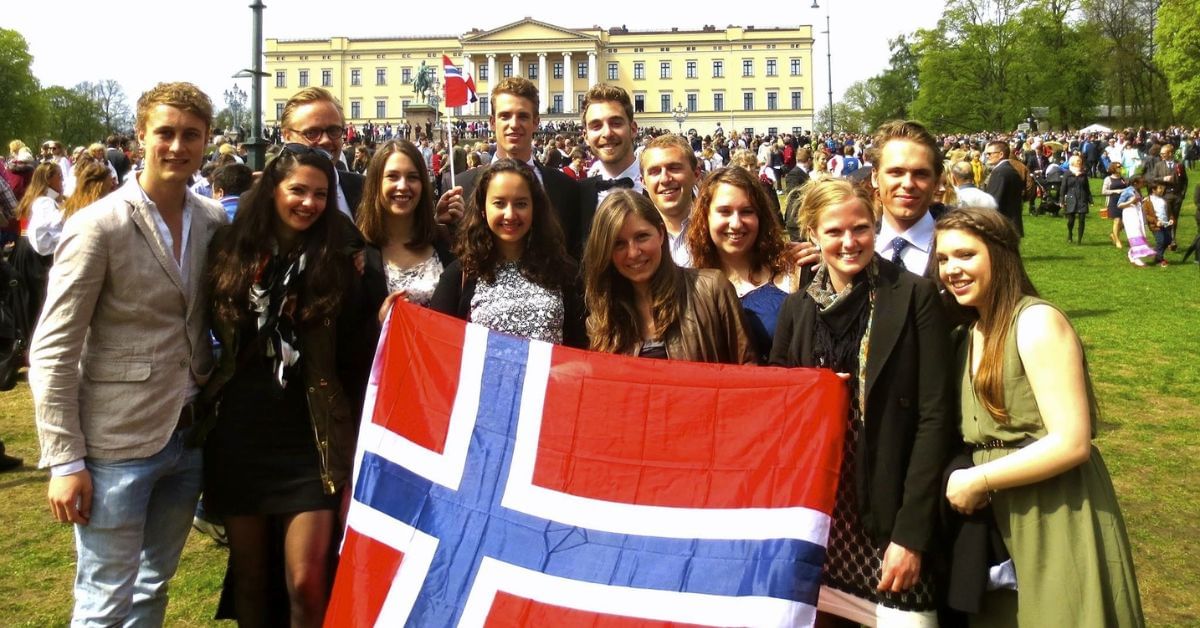Studying in Norway for Indian students is a delightful experience. This Scandinavian unitary constitutional monarchy has a lot to offer to its international students and citizens. The country holds the fourth-highest per capita income globally on the World Bank and IMF listings. As well as the ninth-highest on a broader CIA list. A unique fact that not many people know about Norway is that it is the world’s largest producer of oil & natural gas when we talk about countries outside the Middle East. All these facts make it a pleasure to study in Norway for Indian Students. If you’ve ever pondered over the question: Why Study in Norway – you’ve come to the right place. In this guide, we have detailed out everything you need to know as an international student with respect to studying in Norway.
Study In Norway For Indian Students
When we tap into the education in Norway for Indian students, we understand that international cooperation and student mobility are the chief objectives of the Norwegian Ministry of Education & Research. Along with Indian students, over 12,000 international students are studying in Norway & the country is looking forward to welcoming more.
The internationalisation of higher education leads to the development of English language-based programmes in Norway Schools. Today there are more than 200 Masters Programmes taught in English covering various subject areas. Norway has seven accredited universities, 22 accredited university colleges, nine accredited specialized university institutions, two accredited national colleges of arts and many other private institutes for higher studies.
Recommended Read: Finest countries to find jobs easily
Study In Norway: Key Details
| Population | 5,535,701 |
|---|---|
| Currency | Norwegian Krone |
| Capital | Oslo |
| Universities | 22 |
| Oldest University & Year Of Establishment | The University Of Oslo in 1811 |
| Total Number Of International Students | 12,215 |
| Course Length | 2 Years |
| Fee Structure (Domestic/EU) | None |
| Academic Year | August To June |
If you are an Indian resident who wishes to study in Norway, you will require a Residence Permit for Studies to study in the country. The visa is specifically made for students who are ready to begin their study abroad journey in Norway.
Masters In Norway
The country has a welcoming attitude towards overseas students who come to study for a master’s in Norway. There is an egalitarian approach towards higher studies. The perk of studying master’s in Norway is that all the programmes are tuition-free and many of them deliver courses in the English language. This is the main reason why the country hosts more than 10 thousand international students in various levels of study.
Reasons To Study In Norway
- Norway is regarded among the world’s top countries in terms of wealth, education, health, and security. This attractive country offers a high standard of life.
- Norway is known for its rich past, but it also has a promising future since it focuses a higher emphasis on information, technology, and innovation.
- Norway is a world leader in telecommunications, shipping, oil and gas, high-tech goods, and fish farming. If you wish to work in one of these sectors, studying in Norway will provide you with various choices.
- Colleges in Norway prioritise supporting international students in adapting to a new environment and culture.
- While Norwegian is the country’s native language, English is the second most commonly spoken language. As an international student, you will find it quite simple to adjust to your new surroundings.
- Norwegians are noted for being friendly. Foreign students are made to feel welcome and at ease. They are always eager to help students acclimatise to their new country as quickly as possible.
Norway Universities For Indian Students
The Norwegian education system has either public or private institutions, but most are state-run. The universities in Norway provide you with a comprehensive range of courses and subjects that conduct high-quality research in a variety of fields. The majority of Norwegian students prefer state universities (around 85%). Despite the relatively smaller size of the higher education system, the country has a lot to offer. Check out the table below to find the top-ranking universities in Norway.
You may also like: Countries where you can study abroad for nearly free
Top 5 Norwegian Universities In 2023
| University | Times Higher Education 2023 | QS World University Ranking 2023 |
| The University Of Oslo | 126 | 101 |
| University Of Bergen | 201 | 207 |
| Norwegian University Of Science & Technology | 401 | 352 |
| UIT The Arctic University Of Norway | 501 | 454 |
| University of Stavanger | 501 | – |
Norway is a great place to study engineering if you want to do so on the European continent. This nation has a long history of being renowned for its highly developed economy and cutting-edge technology. The Norwegian University of Science and Technology is one of the top institutes of engineering In Norway for Indian students.
Cost Of Studying In Norway
Norway is a country that enhances higher education to an unprecedented international level. The majority of Norwegian public universities do not charge tuition fees. This applies to students from all nations, whether or not they are EU/EEA members, and is valid for undergraduate degree programmes, master’s programmes, and doctoral programmes.
| University Type | Undergraduate Courses | Postgraduate Courses |
| Public-Funded Universities | €30-€60 (semester fees) | €30-€60 (semester fees) |
| Private-Funded Universities | €7,000-€9,000 | €9,000-€18,000 |
The cost of studying in Norway for Indian students is usually between 300 and 600 EUR, depending on the universities you decide to study. Norway’s cost of living includes housing, food, utilities, books and other study materials. The cost of living in Norway for Indian students ranges from 800 to 1,400 EUR on average per month. The vital factor in considering MBA in Norway for Indian students is that Norwegian universities offer education at meagre and reasonable costs.
How To Study In Norway For Free
While the resounding echoes of free universities in Germany seem to be louder than for most countries, Norway is no less when it comes to tuition fees for international students. In fact, the country is one of the few countries where just like domestic students, even international students are eligible for free education irrespective of whether they hail from EU/EEA countries or not.
Students simply have to pay a semester fee of 30 – 60 EUR to join the student union. The student union fee covers health and counselling services, as well as sports and cultural activities hosted on campus. Tuition fees will be charged to both domestic and overseas students at private universities. Private universities in Norway are less expensive than in other European nations, with tuition ranging from 7,000 to 19,000 EUR per year.
List Of Universities Which Offer Free Education In Norway
If you’re looking for universities in Norway wherein you as an international student will most likely be eligible for free tuition, we have a few of them listed below.
- Norwegian University of Science and Technology
- University of Oslo
- University of Nordland
- Oslo Metropolitan University
- University of Bergen
- Bergen University College
- The Arctic University of Tromsø, Norway
- University of Stavanger
- BI Norwegian Business School
Eligibility To Study In Norway
In Norway, there is no one application portal. Instead, applications are sent to specific universities. This indicates that criteria fluctuate from institution to institution and programme to programme. You should double-check your application before submitting it.
You’ll need to meet the following requirements to apply to universities in Norway in general:
- A fully-filled application form downloaded from the university website
- A verified copy of your passport
- Copies of your transcripts & grades
- A Resume/CV – specifically for postgraduate courses
- English Language Proficiency Requirements as specified by the university
- 2 Letters of Recommendation
Is IELTS Required In Norway?
Even if you do not have IELTS, you can study in Norway provided you satisfy one of the following criteria:
- You must complete one year of university study in an English-speaking country, such as the United States, the United Kingdom, Australia, Ireland, Canada, or New Zealand, using English as the language of instruction.
- Your prior education should have been completed in a university where English was the medium of instruction.
- If you are accepted into a Norwegian institution without taking IELTS, you can apply for a Norway study visa by providing your acceptance letter.
Study In Norway In English
The high level of English in Norwegian society makes it easy for overseas students to study and live there. Almost 200 English-taught master’s degrees are offered, as are several English-taught undergraduate programmes in a number of subjects. International students must be fluent in English in order to be admitted to Norway’s English-speaking universities. You can fulfil the English language requirement by taking one of the following exams:
- A minimum IELTS score of 5.0 is necessary.
- A TOEFL iBT score of at least 60 points or a TOEFL PBT score of at least 500 points is necessary.
Best Courses In Norway
Norwegian universities, in accordance with the Bologna approach, provide three levels of degrees: bachelor’s, master’s, and doctorate. Below are some of the most popular courses in the country:
- Medicine
- Economics
- Law
- Chemistry
- Nursing
- Business Administration
- Mathematics
Admission Process For Studying In Norway
If you’re planning to enrol at the top Norwegian universities, here’s a step-by-step guide on how to apply for the same. However, keep in mind that the application process, eligibility, test scores, documents & transcripts will vary based on the university and the course you have opted for. On a general note, here’s how to go about your application –
- Pick the most appropriate university, degree and course that you intend to study in Norway.
- Pick the most appropriate university, degree and course that you intend to study in Norway. Fill out the application form on the university website with your relevant details
- Gather all relevant documents, such as English Language Proficiency Exam results (IELTS, TOEFL, etc), an academic transcription from your former institution, a letter of recommendation (LOR), a statement of purpose (SOP), your mark sheet or bachelor’s degree, or any other document required by the institution
- You may submit your application form after submitting all essential documents and fulfilling all qualifying criteria, and you will get an offer letter or a letter of acceptance.
Financial Aid In Norway
For non-European applicants, proving a significant level of subsistence is a requirement in order to be granted a student residence permit. If certain requirements are satisfied, you may also be qualified for the Norway scholarship for Indian students and some financial assistance that will help cover some of your living costs. International students may receive financial aid for their entire degree or just a few semesters through a variety of fellowship programmes, scholarship offerings, or student loans.
No matter which course you choose to study there are perks and top-notch education quality guaranteed in Norwegian Universities. Even in professional courses, for example, there are numerous benefits of studying MBBS in Norway for Indian students.
Study in Norway for Indian students is supreme as the education is internationally recognised and helps you prepare for a bright career. Apart from the educational benefits, the country offers a splendid landscape and a beautiful culture that you can explore. Your time in Norway is going to be valuable and memorable. Make sure you make the most out of it. Good luck!
Jobs In Norway For International Students
Whilst studying in Norway, many overseas students work part-time. That is an excellent way to boost your Norwegian while also improving your budget. As an EU/EEA/Swiss citizen, you can work as much as you like in addition to your studies – but keep in mind that you are first and foremost a full-time student. If you are not a citizen of the EU/EEA/Switzerland, you may work up to 20 hours per week during the semester and full-time during the vacations. If you are granted a study permit, you instantly get approval to work part-time
FAQs
Q1. How much time does it take to get my visa?
Ans: Make sure you have extra time for your visa application process. The moment you are accepted and enrolled in a Norwegian university, immediately apply for the Visa and start your application for the Norwegian Residence Permit For studies. Apply at least 2-3 months prior to your starting of the university degree programme.
Q2. How much do I pay for the student visa?
Ans: You will have to pay the fee of 556 EUR when you apply for the Norwegian Residence Permit for studies. The visa processing fee is 21 EUR.
Q3. What documents will I need to get my student visa?
Ans: A proof that you have enough money to support yourself while you stay in Norway, either through an external source or your bank account. Indian students do not have to prove their English proficiency. Indian students are required to take a medical test before they arrive in the country. Indian students are not required to set up a restricted bank account.
If you enjoyed reading this blog on “Study In Norway For Indian Students – A Complete Guide” then make sure you check out our other informative blogs linked below!















0 Comments